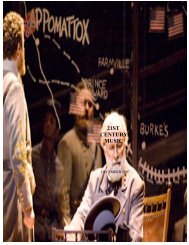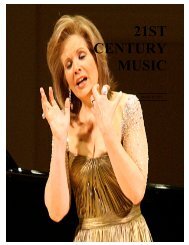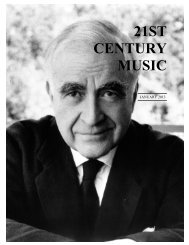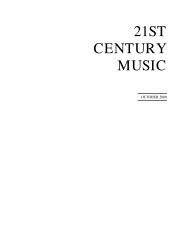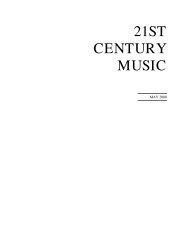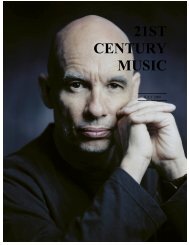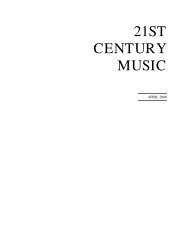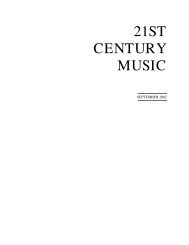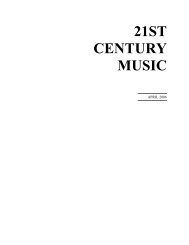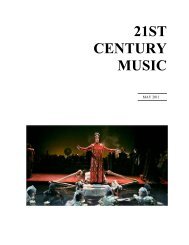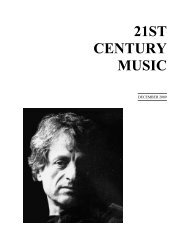You also want an ePaper? Increase the reach of your titles
YUMPU automatically turns print PDFs into web optimized ePapers that Google loves.
LANG: It was led by the teachers. It was led by Martin --<br />
who was an incredible teacher and composer, and very<br />
dedicated and knowledgeable -- and his counterpart, Jacob<br />
Druckman, who was so focussed on his career and so huge.<br />
He was not anti-intellectual, but academic concerns were not<br />
what he thought music was about.<br />
ALBURGER: Really<br />
LANG: He didn't mind intellectual factors, but music was<br />
about certain other things to him. <strong>Music</strong> was about making a<br />
well-made piece; it was about making sure that every<br />
orchestrational detail was actually necessary and musically<br />
valuable. A piece had to suit all sorts of other requirements.<br />
It had to be music that musicians could play, it had to sound<br />
good, it had to be something that was not too difficult to put<br />
together so that it could be rehearsed. There were all sorts of<br />
practical considerations!<br />
ALBURGER: That's interesting, because there was at least<br />
one of his big commissions that did not come to fruition<br />
because of practicality.<br />
LANG: That was for the Metropolitan Opera.<br />
ALBURGER: Right.<br />
LANG: It was just a missed deadline. It wasn't practicality...<br />
ALBURGER: Well, a certain practicality of getting it done in<br />
time!<br />
LANG: Yes! But that was a really good combination,<br />
because Jacob really was about the musician active in the<br />
community. Martin was really about the composer-thinker<br />
and Jacob was really about the composer-doer.<br />
ALBURGER: A good yin-yang combination.<br />
LANG: And it worked very well for us. You'd go to a lesson<br />
with Jacob and the lesson would be undirected because Jacob<br />
would get calls from five different orchestras in Europe, about<br />
different problems about performing his pieces. And the next<br />
week, the lesson would be cancelled because he was at some<br />
big performance with the Chicago Symphony or something.<br />
We used to joke about it, because that was where a lot of his<br />
attention was. On the other hand, we loved it, because it was a<br />
sign that there was hope -- that composers are supposed to get<br />
their music played. I remember at the time actually talking to<br />
someone who was going to Princeton at the time I was going<br />
to Yale, and who was making fun of me for going to Yale.<br />
She was saying, "Well, you know, we're all super-smart at<br />
Princeton, and we're all getting super-educated, and we're all<br />
going to get really good jobs. What are you doing at Yale<br />
You're just learning to get your music played." And I thought,<br />
"Wait a second, we're all composers here. What are we<br />
supposed to be doing" That was a really wonderful thing.<br />
Jacob was a huge inspiration for me: that idea that you are<br />
actually supposed to be in the world, that your music is<br />
actually supposed to be in some sort of connection with the<br />
larger public. That's something that a lot schools don't give<br />
their students: that idea that if you're going to do an opera, it<br />
should be performed by an opera company; if you're going to<br />
do an orchestra piece, it should be performed by every<br />
orchestra in the world. There are some schools where you go<br />
and the lesson is, "Well, you should learn very well how to<br />
write a string quartet." And Yale is not that school.<br />
ALBURGER: Yale taught you some ambition.<br />
LANG: And my fellow students. I was there with Aaron<br />
Kernis and Michael Daugherty and I met Michael Gordon<br />
there.<br />
ALBURGER: Have the Yalies taken over<br />
LANG: No.<br />
ALBURGER: Nevertheless, a high-powered group.<br />
LANG: We've all done well. It's a tribute to our teachers.<br />
ALBURGER: And the mutual student inspiration.<br />
LANG: Yes.<br />
ALBURGER: So you met Michael Gordon then<br />
LANG: Michael and I met at the Aspen <strong>Music</strong> Festival,<br />
actually, and we re-met at Yale. We actually were the<br />
troublemakers at the back of the class --<br />
ALBURGER: Surprise.<br />
LANG: -- harassing every guest composer who came to our<br />
seminar. We had incredibly boring seminars, because visiting<br />
composers would come through...<br />
ALBURGER: Who showed up Whom did you harass<br />
7



